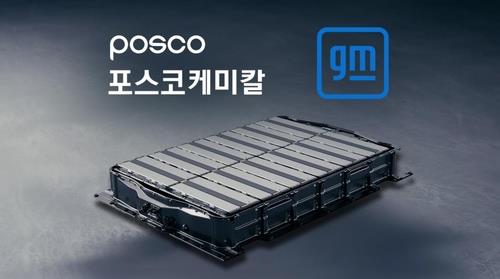- California Assembly OKs highest minimum wage in nation
- S. Korea unveils first graphic cigarette warnings
- US joins with South Korea, Japan in bid to deter North Korea
- LPGA golfer Chun In-gee finally back in action
- S. Korea won’t be top seed in final World Cup qualification round
- US men’s soccer misses 2nd straight Olympics
- US back on track in qualifying with 4-0 win over Guatemala
- High-intensity workout injuries spawn cottage industry
- CDC expands range of Zika mosquitoes into parts of Northeast
- Who knew? ‘The Walking Dead’ is helping families connect
POSCO Chemical, GM agree to form cathode joint venture
South Korean chemical maker POSCO Chemical Co. said Thursday it has agreed with U.S. auto giant General Motors Co. to set up a joint venture for a key component for electric vehicle (EV) batteries and build a plant in North America.
The cathode materials JV will begin production of high-nickel cathodes in 2024, which will be supplied to Ultium Cells that manufactures batteries for GM’s EVs.
POSCO Chemicals, a unit of POSCO Group whose flagship is steel titan POSCO, said it will later announce specific plans for the envisioned JV, including the amount of investment and the plant’s location.
POSCO Chemical is the first battery materials company that has agreed to establish a JV with a carmaker. The JV is expected to help POSCO Chemical create a cathode supply network in North America.
A cathode is one source of lithium in a lithium-ion battery and is also a key component of EV batteries. It accounts for about 40 percent of a battery’s cost of production.
In December last year, POSCO Chemical was chosen as a supplier of cathode materials for Ultium Cells and is building a plant with an annual capacity of 60,000 tons in the southwestern port of Gwangyang.
Ultium Cells, a joint venture that LG Energy Solution and GM set up in 2019, has been building a battery cell facility in Ohio and another in Tennessee.
POSCO Chemical’s JV with GM is part of POSCO Group’s push to boost its EV business in recent years as part of a diversification strategy.
In August this year, POSCO Chemical decided to build a cathode and precursor plant in China with an annual production capacity of 30,000 tons and is seeking to construct another in Europe
POSCO Chemical has unveiled plans to increase its annual cathode production capacity to 105,000 tons in 2022, 280,000 tons in 2025 and 420,000 tons in 2030.
POSCO Chemical currently operates cathode material plants in the southeastern industrial city of Gumi and in Gwangyang.
The EV battery market has been growing fast as global automakers rush to go electric and eco-friendly due to tighter rules on greenhouse gas emissions seen as the main culprit for global warming.












